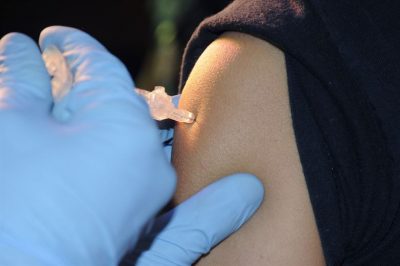
Earlier this week, CVS Pharmacy on Boston University’s East Campus ran out of surgical masks, according to signs posted on each door. While many students are taking personal precautions to stay healthy, such as purchasing surgical masks, the university is also taking steps to prevent disease spread.
Surgical masks are used to prevent the spread of germs from inhalation, according to the Centers for Disease Control and Prevention. However, masks are not necessary for flu prevention, especially if a person has no symptoms.
Judy Platt, director of BU’s Student Health Services, told BU Today that there have been 46 cases of the flu this season on campus.
Flu activity during the year is the highest between October and May, peaking in December between February, according to the CDC. There have been an estimated 22 to 31 million cases of the flu in the United States so far this season, as well as 12,000 to 30,000 deaths as a result.
Brian Yun, medical director of Massachusetts General Hospital’s ED Observation Unit and physician advisor to Case Management at Massachusetts General Hospital, said it is unclear how this year’s flu cases will compare to other years.
“We continue to see an increase rate of influenza for the season,” Yun said. “It’s not quite clear yet whether or not it’ll be there’ll be more cases this year than last year or two years ago.”
The flu is more easily caught than a cold, according to the SHS website. Symptoms include a fever above 100.4 degrees, congestion, muscle aches and a sore throat.
Colin Riley, a spokesperson for BU, said that around 600 students got a flu vaccine this year at the university’s immunization clinics, which is a record amount. He also said that it’s important for people to not only get their flu shot, but to also take part in other preventative measures.
“The best prevention, besides the vaccine, is to be well-rested. Eat well, sleep well and have some physical activity,” Riley said. “Wash your hands frequently and thoroughly when you do. Be careful about touching surfaces and then touching your eyes, nose and mouth.”
SHS offers student immunization clinics throughout the year, according to their website. All required vaccines are offered, including those for meningitis and varicella, as well as optional vaccines for HPV and the flu.
“It prevents the spread or more widespread number of cases,” Riley said.
Students with a dining plan have the option of ordering a flu meal through Dining Services’ ‘Rhetty to Go’ initiative. It contains mild foods like bananas, rice, crackers and yogurt.
Yun said college students are no more at risk of catching the flu than the general population. He said that the disease spreads from human contact regardless of where they are.
“The flu is all around us and it can be spread from person to person,” Yun said. “And you can imagine if one person is sick, whether it’s at a college or household, it can potentially spread to students or family members nearby.”
This year, the coronavirus outbreak has overlapped with the flu season. It was first identified in Wuhan, China in January, resulting in at least 1,000 deaths in the country, as announced by Chinese officials Tuesday.
Officials told BU Today that people who develop fever, shortness of breath or a new cough within 14 days of potential exposure to the coronavirus should remain at home. They also encouraged students to reach out to SHS and faculty to Occupational Health Services with any concerns.
A student at the University of Massachusetts Boston was confirmed by the CDC to have the coronavirus, making it the eighth case in the United States at the time, according to Business Insider.
Despite concerns about the spread of coronavirus, Riley said the university will be taking the same health precautions as usual and, flu wise, BU doesn’t face as much of a risk this year as in the past.
“I don’t think there’s anything unusual about this flu season,” Riley said. “It’s not [spreading] on as much of a large scale as it has been in previous decades.”
Like the flu, Yun said it is still too early on to tell how much coronavirus will spread and how large its impact will be.
“Coronavirus has not gone to that extreme at this point in time and depending on what happens at the end of the day, it could be deadlier or it could be not as deadly,” Yun said. “It’s a little too early to tell the true impact this virus will have on mortality.”
Kendall Gregory, a junior in the College of Fine Arts, said she is taking extra precautions this flu season to keep herself well.
“I’m washing my hands a lot… and making sure that I’m keeping myself clean,” Gregory said. “I’m going to get a flu shot and trying to eat healthy.”
Julie Abi-Elias, a sophomore in the College of Arts and Sciences, said she has not gotten sick this flu season and recommends many of the same preventative measures as Riley.
“I have been trying to avoid contact with other people,” Abi-Elias said. “I know there are things like Emergen-C. My roommate always drinks it. I haven’t done it, but it helps a lot of people I’ve heard.”
Melissa Ngo, a freshman in the College of General Studies, said despite the fact that it coincides with flu season, she does not see concern of coronavirus at BU.
“Honestly, I don’t think it’s much of a danger to anyone around here. Everyone’s just ‘normal’ sick,” Ngo said. “I haven’t heard of anyone being so definitely sick that they’re staying home from classes or anything.”





























































































































